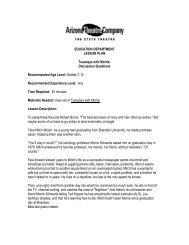THE KITE RUNNER Arizona Theatre Company Play Guide 1
THE KITE RUNNER Arizona Theatre Company Play Guide 1
THE KITE RUNNER Arizona Theatre Company Play Guide 1
You also want an ePaper? Increase the reach of your titles
YUMPU automatically turns print PDFs into web optimized ePapers that Google loves.
<strong>THE</strong> <strong>KITE</strong> <strong>RUNNER</strong><br />
TALIBAN<br />
The Taliban immediately put into effect a very strict version<br />
of Sharia (Islamic) law. Any activities seen as “frivolous” or<br />
influenced by the West were immediately outlawed. The<br />
Taliban believed the only way to help Afghanistan was to<br />
weed out anything that took the focus from adherence to<br />
Islam. Examples of their restrictions included outlawing<br />
television, music, the internet and even kite flying<br />
because these activities did not fit in with their hard-line<br />
We all celebrated in 1996 when the<br />
Taliban rolled in and put an end to the<br />
daily fi ghting. – Rahim Khan, The Kite<br />
Runner<br />
interpretation of Islamic law. A man without a beard could be beaten and a woman wearing<br />
fingernail polish could have her fingertips chopped off as punishment. Prior to the Taliban<br />
taking control of Afghanistan, women had been allowed to receive an education and, while<br />
modest dress was important, extreme strictures were not in place. Following the takeover of<br />
the Taliban, women’s education was outlawed and the all-covering burqa became a mandatory<br />
part of life for women when they left their homes (which was<br />
only legal if they were supervised by a male relative). Beatings,<br />
executions, stonings and ethnic and religious-based cleansing<br />
were all instituted by the Taliban in order to keep Afghanistan<br />
on a “proper religious track.” As the Taliban is comprised<br />
predominantly of ethnic Pashtun who are mostly Sunni Muslims,<br />
they particularly focused on the Shiite Hazara population for<br />
persecution. The most famous of these systematic massacres<br />
took place at Mazar-e-Sharif in 1998, but there were many other<br />
instances where the Taliban ordered the execution of ethnic<br />
Hazaras en masse.<br />
Afghan women in burqas<br />
being provided a safe haven in their country. U.S.-<br />
led coalition forces drove out the Taliban and<br />
killed many members. However, Taliban members<br />
are known for being fierce fighters, very willing<br />
to go to their deaths as “martyrs” for their cause.<br />
The Taliban forces have continued to regroup and<br />
threaten, harass and murder their fellow Afghans.<br />
Using remote lands in Pakistan as a base, the Taliban<br />
have continued to work to destabilize the elected<br />
government in Afghanistan. Suicide bombings have<br />
become much more frequent in both Afghanistan<br />
and in neighboring Pakistan.<br />
The Taliban was ousted from power following the September<br />
11th attacks in 2001. The Taliban refused to cooperate with<br />
western countries to capture Osama bin Laden when he was<br />
Press conference with the Taliban<br />
following the September 11th attacks<br />
<strong>Arizona</strong> <strong>Theatre</strong> <strong>Company</strong> <strong>Play</strong> <strong>Guide</strong> 14


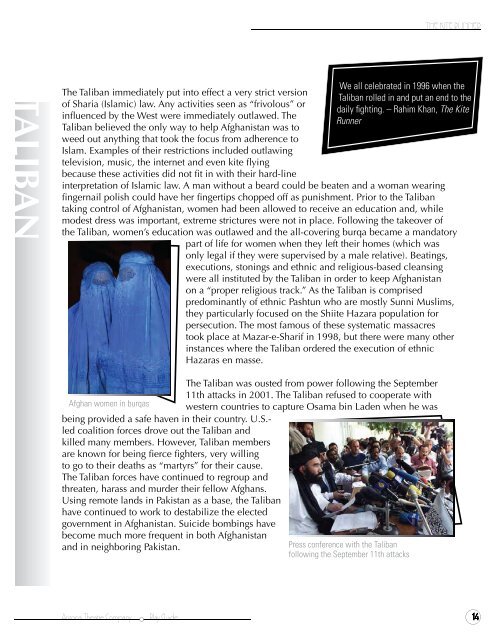
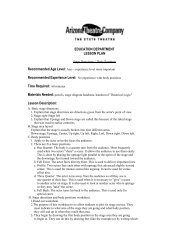

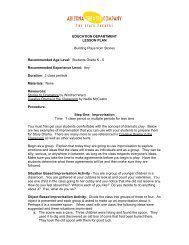

![Play Guide [356k PDF] - Arizona Theatre Company](https://img.yumpu.com/46218320/1/190x245/play-guide-356k-pdf-arizona-theatre-company.jpg?quality=85)

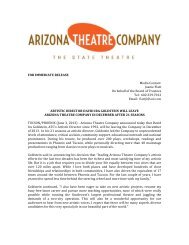
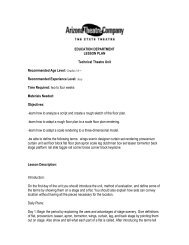

![[title of show] Arizona Theatre Company Play Guide 1](https://img.yumpu.com/24482689/1/190x245/title-of-show-arizona-theatre-company-play-guide-1.jpg?quality=85)
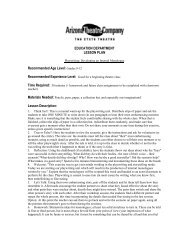

![Play Guide [1.2MB PDF] - Arizona Theatre Company](https://img.yumpu.com/11952176/1/190x245/play-guide-12mb-pdf-arizona-theatre-company.jpg?quality=85)
